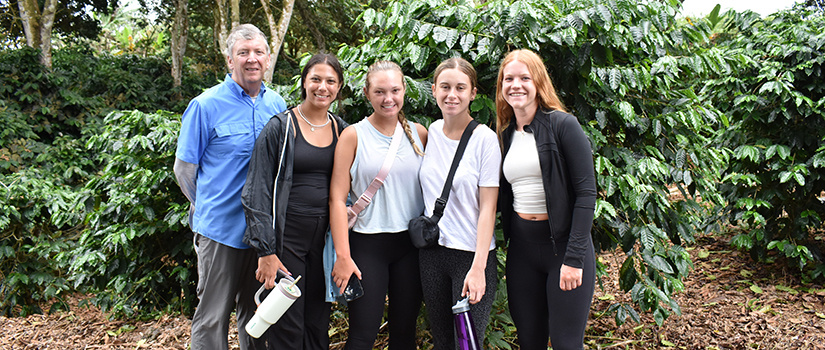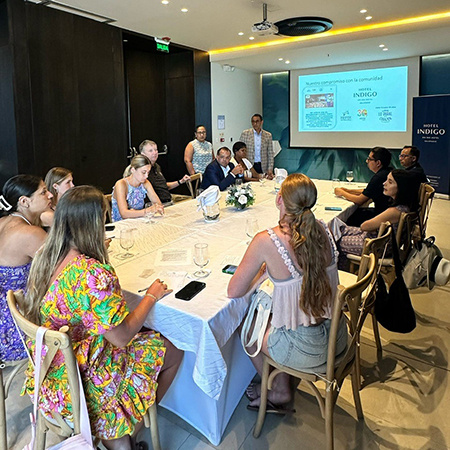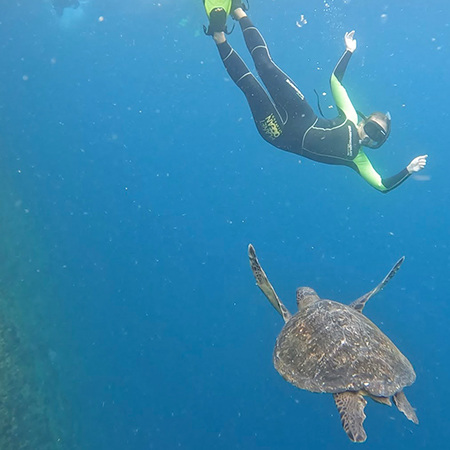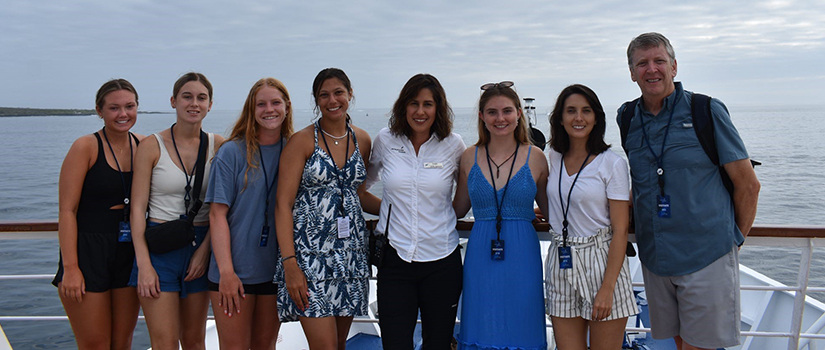The Galápagos Islands: the name alone conjures images of tropical beauty and natural treasures. Spanish Captain Diego de Rivadeneira called them "Las Islas Encantadas" on his first visit in 1546, and that nickname lingers still. Charles Darwin's studies there in 1835 played a big part in the development of his theory of evolution. Now, University of South Carolina students follow in his scholarly footsteps.
Through a partnership with USC's Education Abroad Office and the Universidad San Francisco de Quito, College of Hospitality, Retail and Sport Management students have a variety of opportunities to live and learn in one of the most exclusive tourism and natural heritage destinations in the world. Semester-long experiences are available as well as three-week Maymester excursions.
This May, School of Hospitality and Tourism Management Instructor Kevin Ayres led an Economically Sustainable Hospitality Operations class, exploring the challenges of keeping hospitality and tourism businesses sustainable while remaining profitable.

Ayres and USFQ Professor Paola Torres led the students on visits to three businesses on the trip, beginning with Hotel Indigo, an IHG property on San Cristóbal Island. The class met with the hotel management team and took a full tour of the operation. Each student then wrote a paper with recommendations for possible improvements in hotel operations with a focus on sustainability.
The second visit was to the Metropolitan Cruise Lines expedition ship La Pinta. There too, the students observed and asked questions while touring and meeting with the crew. They also wrote papers with operations suggestions.
"We learned about sustainability and the huge difference between learning about sustainability in Columbia, South Carolina, versus learning about sustainability in the Galápagos," said Ava Jackson, a retailing student who took the class to conclude her freshman year.

The last business visit was to Ranti Coffee. "It’s a Galápagos-only company. They have their own tree, roasting room and showroom, all on San Cristóbal," Ayres says. The students took a close look at every part of the operation, again discussing and questioning and offering their suggestions for operational improvements.
The hospitality and tourism industry is by far the largest economic driver in the Galápagos, employing 40 percent of residents. With 97 percent of the islands set aside as a national park, it is an ideal setting for studying sustainable hospitality and tourism, a topic of critical importance in South Carolina. USC’s School of Hospitality and Tourism Management has produced many of the current leaders of those industries, and the next generation is learning through experiences like these.
Study abroad experiences are not all work, of course. Students also have a chance to explore new cultures, meet new people, and have a lot of fun.
"My favorite part of the trip was getting to stay with my host family," Jackson says, adding that she joined the family in attending a soccer game while there. "Being able to stay with them gave me the opportunity to see San Cristóbal through the eyes of locals. This is something I wouldn’t have gotten to experience if I wasn’t able to stay with a host family. I appreciate USC setting me up with such a caring family."

As all USC trips do, the most recent Maymester excursion offered many chances for students to explore, including nature hikes, snorkeling at spots including the world-famous Kicker Rock, scuba diving (students can earn certification through USC, and College of HRSM professor and certified instructor Richard Southall teaches a class on sustainability, eco-tourism, and the diving industry in the Galápagos) and of course plenty of time to enjoy some of the world’s most beautiful beaches.
Asked what will stick with her in the future, Jackson says, "How amazing our world is. We had opportunities to see such a variety of animals (marine iguanas, Galápagos tortoises, blue footed boobies) that only exist in the Galápagos. I also learned from the other classes, it was truly a multidisciplinary program."
For those unsure whether to study abroad, Jackson's advice is simple and emphatic: "Do it, take in every experience you can. It’s something you’ll look back on the rest of your life and be so grateful that you did. You get to meet so many people that you wouldn’t have without studying abroad and seeing the world. Totally immerse yourself, go on all of the excursions. You will have experiences and memories that you will treasure. I learned so much and had a blast!"
